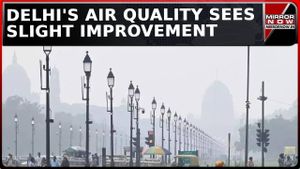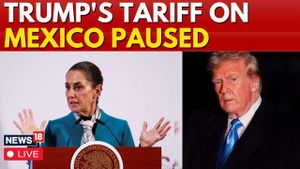Conor Murphy, Sinn Féin's Economy Minister, has made headlines with his recent election to the Seanad, the upper house of the Irish Parliament, coupled with his resignation from his ministerial role at Stormont. Securing one of the coveted 60 seats available, Murphy's victory was largely propelled by the support of his party's TDs and councillors, emphasizing Sinn Féin's strategy to widen its influence beyond Northern Ireland.
The early hours of Monday saw Murphy's election confirmed around 1 am, highlighting not just his personal achievement but also Sinn Féin’s determination to position itself firmly on the agenda of unification discussions. Following this momentous win, Murphy expressed, “I’m delighted to be a northern voice in the Seanad,” pointing to his intention to provide insights from Northern Ireland amid broader debates concerning Irish unity.
Murphy’s aspirations do not merely rest on being part of the Seanad; he aims to proactively engage with the dialogue on the unification of Ireland—a subject he insists cannot be ignored any longer. “There’s no point in putting your head in the sand and hoping this discussion is going away. It’s not. It’s gaining momentum and I hope my presence here adds something to it,” he stated following his election.
This transition marks the end of Murphy's notable career at Stormont, where he not only held the pivotal position of Economy Minister but also wielded influence across various portfolios including finance and regional development since entering politics in 1998. Over the years, he has been instrumental, particularly as the MP for Newry and Armagh, where he succeeded the SDLP's Seamus Mallon, carving out his space within Northern Ireland's political arena.
While some may view Murphy’s move to the Seanad as diminishing his political standing, his party perceives it as elevative of their agenda. The Seanad, once considered elitist and largely criticized by Sinn Féin, now appears to be seen as fertile ground for advocating for Irish reunification—a shift demonstrating the party’s changed perspective. Murphy pointedly said, "Sinn Féin will work with all parties to realise...ensuring momentum continues to grow,” signaling his readiness to collaborate across the aisle for what he considers pressing national interests.
His lengthy election process revealed the stakes involved, as he faced considerable delays due to the elimination of other candidates resulting in fewer transfers, yet his determination remained palpable. “I believe my experience as a minister and as a negotiator will bring positive influence to this debate,” he said, projecting confidence for the challenges he will tackle at the Seanad.
The urgency around discussions of Irish unity often stands at odds with current issues dominating the political scene, such as the housing crisis gripping the Republic and varied economic concerns arising from global uncertainties. Murphy, nevertheless, remains undeterred by these distractions, and his successful election could signal potential shifts in focus—a voice from the north tapping intensely on matters of national significance.
Aside from immediate policy discussions, Murphy's comments about unification resonate with many, particularly as he aims to bridge gaps between populations historically divided by borders. He remarked, “I think there are northern voices needed there to give the all-Ireland perspective. So I am very much looking forward to the challenge,” underscoring the importance of articulately addressing cross-border issues and intertwining economic policies.
While Murphy’s shift to the Seanad opens doors for potential debates on Irish unity, there are significant questions about the next steps for Northern Ireland’s governance. Murphy acknowledged the difficulty of saying goodbye to his ministerial role, stating, “The Department for the Economy is a great department, and I very much value the work we’ve done there.” His confidence in the groundwork laid, he looks to his successor to maintain those priorities.
Speculation surrounds who will take over as Northern Ireland faces continued challenges linked to its health system and government stability. Incoming minister Caoimhe Archibald, once responsible for finance, will step up amid these pressing issues following Murphy’s departure, reflecting the changing tides of Northern Irish politics.
Critics and supporters alike now watch closely to see how Murphy’s voice will influence the Seanad and the Republic's governing bodies. His rich legacy as one of Sinn Féin's most prominent ministers could be reshaped as he adapts to the dynamics of politics south of the border. “I have many contacts and negotiating experience, which I hope to utilize to influence the debate on unity moving forward,” he concluded.
Overall, Murphy's election and resignation signify not only personal milestones but also represent shifts in Sinn Féin's long-term political strategy—a commitment to addressing old divides with newfound energy and aspirations for unity across Ireland.



